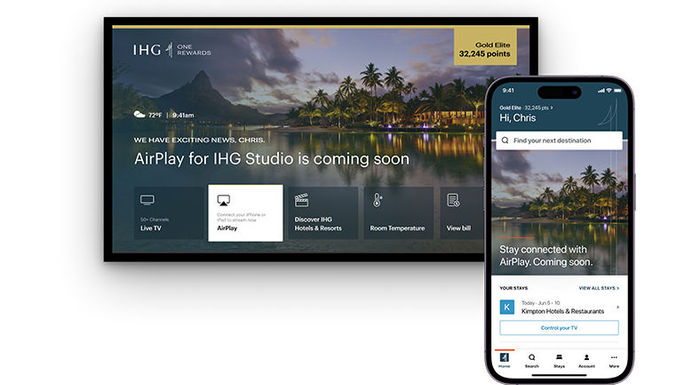The Latest Trends in Hotel Room Entertainment Offerings

Who doesn’t love a nice hotel room? A sanctuary where you can leave the duties and stresses of everyday life behind, enjoy some much-needed relaxation and enjoy the hotel amenities on offer.
The added bonus of many hotels these days? The growing variety and sophistication of in-room entertainment.
And just so you’re not confused, the days when pay-per-view in-room movies were the main source of entertainment are old-fashioned. In 2023, in-room entertainment in hotels is evolving to include everything from virtual reality and augmented reality to tailored content recommendations derived from AI and the use of mobile phones and iPads to deliver your own entertainment.
“The world of in-room hotel entertainment is undergoing a technological revolution driven by interactive experiences, personalized content and unique offerings,” said Sarah Lynch, executive vice president of the Hilton Garden Inn & Homewood Suites San Diego.
Lynch’s views have been shared by numerous hotel industry insiders, who say it is an exciting time in the hotel industry, particularly with the latest in room entertainment. Hotels are investing millions of dollars to improve the guest experience, and that includes an increasing number of interesting room features.
Voice controlled smart rooms
Using voice controls to activate functions around your home is nothing new. Alexa has been an integral part of our lives for quite some time. Something newer, however, is that voice control is also finding its way into hotel rooms.
“Voice-enabled technology is growing in popularity, allowing guests to control various aspects of their room using voice commands,” explains Lynch. “Hotels are integrating voice assistants like Amazon Alexa or Google Home so guests can use voice prompts to adjust room temperature, request room service, schedule wake-up calls and explore local attractions.”
The Wynn Las Vegas was at the forefront of this, years ago introducing voice-controlled rooms where guests can control lights, curtains, and other amenities through simple voice commands.
Alexa for Hospitality, a special version of Echo technology designed to enhance the customer experience in hotels and act as an in-room concierge, enabled these early adopters. Now more and more hotels are jumping on the bandwagon, says Lynch.
Virtual Reality and Augmented Reality
An example of an even more high-tech advance is the integration of AR technology in guest rooms at some hotels. It is used to enhance the spatial experience by overlaying digital content onto the physical environment.
How does it look? Hotels use augmented reality to provide interactive maps, historical information and even virtual concierge services via guests’ smartphones or dedicated AR devices. “The Ritz-Carlton, for example, offers an AR app that enables virtual tours and immersive storytelling of its properties,” explains Lynch.
Some hotels are working entirely independently of augmented reality to integrate virtual reality entertainment. For those who aren’t quite sure what the difference is, with AR, part of the environment is real, and AR technology just adds layers of virtual objects to your environment. In virtual reality, on the other hand, the environment is entirely virtual and generated by technology.
“Some forward-thinking hotels are experimenting with VR, offering immersive experiences like virtual tours of local attractions or virtual wellness sessions,” explains Hans Mast, travel expert and consultant at Golden Rule Travel.
If the development of VR makes you wonder why you should go to a hotel and not visit the sights in person, you are not alone. Mast has an explanation.
“While it’s true that real-life exploration has its own appeal, VR offers a unique, immersive experience that can’t easily be replicated,” he says. “Think of it as an added value – you can preview attractions or enjoy a virtual beach vacation right from your room.”
However, even Mast admits that this type of VR offering is not yet widespread. However, he says interest is actually growing, particularly in the luxury sector.
“As VR technology becomes more accessible and affordable, I believe we will see broader adoption in the hospitality industry,” adds Mast.
Personalized content and recommendations
To offer increasingly personalized experiences, hotels are also using data analytics and AI algorithms to offer guests personalized in-room content and recommendations.
By analyzing guest preferences in advance, hotels can suggest movies or shows that match individual interests. The Four Seasons Hotels and Resorts uses AI-powered technology to create personalized recommendations based on previous stays and guest preferences, says Lynch.
Golden Rule Travel’s Mast also sees this trend gaining momentum.
“When I say personalization, I mean things like offering recommended shows, music playlists, or even video games based on guest preferences,” says Mast. “It could be as simple as knowing a guest’s favorite genre of music or film and providing that to them immediately.”

IHG Hotels & Resorts is adding AirPlay to its rooms. (Photo Credit: IHG Hotels & Resorts Media)
In-room entertainment through mobile devices
In a world where smartphones have practically become an appendage of the human body, this next prediction should come as no surprise: cell phones will increasingly become an integral part of in-room entertainment functions.
“Keep an eye on the growing role of mobile devices in in-room entertainment,” says Mast. “Guests increasingly prefer to control their room settings and entertainment via their smartphones, and we’re likely to see greater integration of hotel services with guest devices in the future.”
However, the future is clearly already here. The June 2023 announcement by IHG Hotels & Resorts fits the bill.
The company has just partnered with Apple to introduce AirPlay in hotel rooms, an offering that gives guests the ability to seamlessly share content from their iPhone or iPad to the guest room TV. AirPlay is scheduled to roll out at select IHG hotels around the world before the end of 2023.
Once AirPlay is available at an IHG hotel, guests will be able to scan a QR code unique to the TV in their room to enjoy a personalized TV entertainment experience.
“Our guests can now enjoy the convenience of streaming directly from their iPhone or iPad to our in-room technology, creating a more homelike atmosphere than ever before,” said George Turner, chief commercial and technology officer, IHG Hotels & Resorts.
Some industry experts are even predicting a future where TVs in hotel rooms will be phased out entirely, thanks to increasing reliance on cell phones and iPads for entertainment. As this approach to streaming entertainment becomes more widespread, hotels may decide to remove fixed flat-screen TVs from guest rooms and replace them with… you guessed it: high-tech offerings.
“Hotels can set up a virtual or digital wall display to project whatever content the guest wants from their mobile device,” said Philip Ballard, travel expert and chief communications officer at HotelPlanner.
“Many travelers have become so connected to their smartphones, tablets and laptops that they don’t even turn on the in-room TV during their stay unless there’s a game on,” adds Ballard.

Smartphone and tablet on the bedside table in the hotel room. (Photo via LightFieldStudios / iStock / Getty Images Plus)
looking ahead
The future of in-room hotel entertainment promises even more exciting developments, experts say. And yes, this will likely involve increased integration of the latest technology to care for and entertain guests, as well as the elimination of outdated forms of entertainment.
“Virtual reality is expected to continue to evolve, offering guests the ability to immerse themselves in lifelike simulations of travel destinations, historical eras or events,” said Lynch of the Hilton Garden Inn & Homewood Suites.
Wearable technology is also on the horizon and could be used to allow guests to control in-room amenities and provide even more seamless access to entertainment options.
And while it might sound a little far-fetched, holographic displays could also be part of hotel rooms in the years to come, potentially being used to bring 3D visualizations and interactive experiences right into the room.
“With continued advancement on the horizon, hotels are poised to offer guests memorable and immersive experiences, elevating their stay to new levels of enjoyment and engagement,” said Lynch.
However, it will be at least a decade before many of these developments fully come to fruition. It also remains to be seen how widespread such offers will ultimately be. In many cases, it comes down to how much money a hotel can afford.
“Equipping entire hotel chains around the world with next-generation room technology is a very expensive proposition for hotels,” concludes Ballard.
For the latest travel news, updates and offers, subscribe to the daily TravelPulse newsletter here.